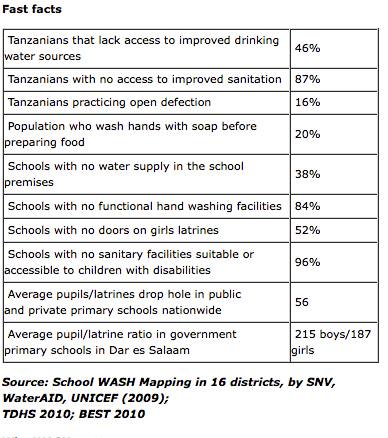
Why WASH matters
Up to one third of deaths in children under-five years in Tanzania are related to poor hygiene. This includes nearly 20 percent of under-five deaths due to preventable diarrhoea totalling nearly five children every hour, as well as deaths among newborns and due to respiratory illness.
Hand washing with soap, alone, has the highest impact on reducing disease transmission, including diarrhoea, lowering the condition by about 47 percent. However, awareness about the importance of hygiene practices, especially hand washing with soap, is low.
Sanitation has the second highest impact on reducing diarrhoea, decreasing the impact by about 36 percent. Nevertheless, access to safe drinking water and to improved toilets that can be kept clean continues to constrain Tanzania’s ability to adequately address the under-five child mortality rate.
In addition, limited access to adequate WASH services is hampering national efforts to eradicate malnutrition, stunting and others.
With 70 percent of the health sector expenditures being utilized for treating preventable WASH related diseases, Tanzania is likely to incur more than US$ 500 million in this relation during the fiscal year 2011-2012 alone, further constraining the already constrained economy.
A clean environment for children
Children spend a significant amount of time in and around their schools. Inadequate water supply and sanitation facilities, not only are a health hazard, but also affect school attendance, retention and educational performance. Yet these invaluable commodities are not available to many Tanzanian school children.
Water, sanitation and hygiene (WASH) facilities in Tanzania’s schools are extremely poor. The rapid increase in primary school enrolment since the abolition of school fees for primary education in 2002 has put a heavy burden on existing school infrastructure and particularly on WASH facilities, which generally were already suffering from poor operation and maintenance.
Many new schools and classrooms are built with no consideration for WASH facilities or if built, these rarely follow any standards.
National data shows that on average there is only one pit latrine for every 56 children in primary schools (both public and private), yet there are sharp regional differences and differences between government and private schools.
Government primary schools in Dar es Salaam, the nation’s largest city, are especially poorly served with Ministry of Education data showing only one latrine for 215 boys and 187 girls.
A detailed 2009 study supported by UNICEF and other partners that covered all schools in 16 districts showed that over 80 percent of schools lacked functioning hand-washing facilities, and virtually none had any soap available. Only four percent of schools had made any sanitation or hand-washing provision for children with disabilities.
After reaching puberty, girls in particular are less likely to regularly attend school if toilet and hygiene facilities are inadequate or non-existent. Children in such schools also face increased health risks including diarrhoea, worms and urinary infections – which can impact their ability to learn and could result to increased absenteeism.
Schools where water and sanitation facilities lack privacy, are unsafe, or are non-existent are likely to have the poorest attendance records and highest drop-out rates.
Improving WASH in schools is essential for keeping girls in school, and ensuring their right to education. Poor attendance often translates into poor performance, and students who perform poorly are more likely to drop out early from school.


